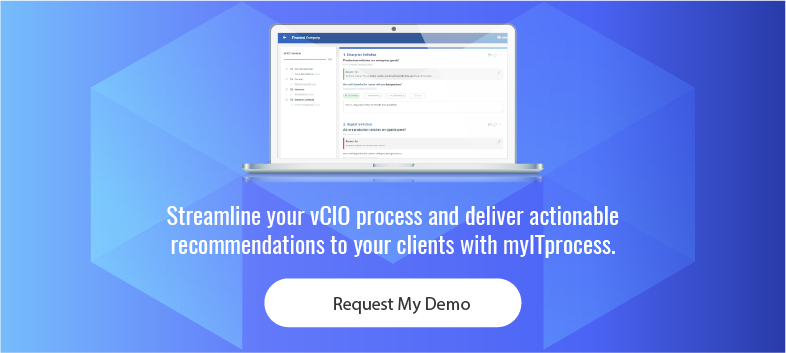A lot of the business world for many years has revolved around the idea of being as efficient and robotic as possible to make sure we are as profitable as possible. And don’t get us wrong, being efficient is great and necessary to have a good business, but for so long the ‘softer’ skills have been neglected, especially in the tech world. The idea of understanding how we work as people and using that as a context to help others and ethically make money is relatively new.
Using emotional intelligence as a vCIO can come in quite handy; once we know the communication tactics available to us on an emotional level to connect with others, we can more easily frame our technical findings into a business recommendation that the client will actually listen to. Gary has learned if you don’t cater to emotional pain, things often don’t close or don’t get accepted.
We are also in an odd social climate right now. Companies are going back to work more normally and opening up and meeting in person, and it feels strange after 15 months of being almost entirely sequestered. People are starting to understand more how valuable and comforting human connection is, so many TruMethods members are starting to reach out to their customers in more of a ‘how are you doing as a human’ way as opposed to just a straight business meeting. Additionally, we are all interested in going out and doing SOMEthing with some semblance of normalcy, and in a group, and this can be something we can take advantage of to get our customers to see us in a more human way. People are going to be much more likely now to be a part of your wine tasting or movie night and do other activities that make it easier to build a relationship than they were before everything closed down
Additionally, sometimes efficiency can actually get in the way of the relationship. If the only interaction we have with our clients is jumping straight into the agenda and only entirely task-driven it can actually put some people off. While no one wants to stereotype, oftentimes the people who are drawn to technical work are not always the same people who like to chit chat, check in, and to whom small talk comes naturally. We have to remind ourselves that our jobs will be easier and more enjoyable (especially from the customer end) to soften those edges and appeal human to human.
So how do we quantify this? We can still put a process with edges around the process of reaching out casually to our customers. Playbooks can have vCIO unique touches, dashboards can be created, and tasks can be made in PSAs to remind us to reach out and keep track of when we last spoke to someone. Just because a ‘softer’ skill is involved doesn’t mean we can’t have ‘harder’ edges around the activity required. It will also benefit the entire team if there are copious notes taken about the relationship in some kind of program so if the current vCIO is incapacitated in some way, another team member can take up the relationship.
How do we actually talk to people and start that conversation? The easiest way to start a conversation is to find something in common with the person you are speaking with. Most people are going to light up by talking about their kids, pets, or sports. We could even go on their LinkedIn and see the things the DM posts about or is interested in and try to work those things into the conversation.
Another thing to consider is to reflect the way the client communicates with your own style. People like people that talk the same way that they talk. If you’re a fast talker and the client talks more slowly, slow your pace down. Try to reflect your body language to look like theirs. All of these things will build familiarity in the client’s mind (whether they realize it or not) and not only foster a more personal connection, but soften them to the idea of a larger project they may not have been open to before they got to know you as a person.
While people skills might be something that doesn’t come easily to all, everyone benefits from having a few things up their sleeves to connect with their fellow humans. Understanding yourself, understanding a bit how others work, and paying attention to the personality of the person you are speaking to will go a long way to ingratiate others to you and your ideas. While it may seem a little nefarious to use tactics that are basically manipulative to sell something, sometimes it is necessary to get the client to see the value in what we have to offer and the projects we are suggesting. It is with great care and delicacy that this writer says in this case, the end justifies the means. As long as we continue to keep the client’s needs and wants in the forefront of our conversations, our minds, and our suggestions, all these tactics are helping us do what we do, but better. Emotional intelligence will only help you as a business person be the best team player you can be.


